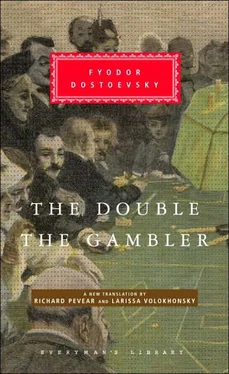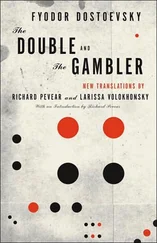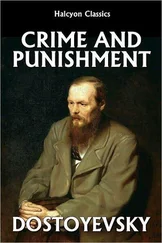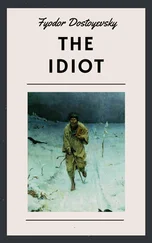Fyodor Dostoevsky - The Double
Здесь есть возможность читать онлайн «Fyodor Dostoevsky - The Double» весь текст электронной книги совершенно бесплатно (целиком полную версию без сокращений). В некоторых случаях можно слушать аудио, скачать через торрент в формате fb2 и присутствует краткое содержание. Жанр: Классическая проза, на английском языке. Описание произведения, (предисловие) а так же отзывы посетителей доступны на портале библиотеки ЛибКат.
- Название:The Double
- Автор:
- Жанр:
- Год:неизвестен
- ISBN:нет данных
- Рейтинг книги:4 / 5. Голосов: 1
-
Избранное:Добавить в избранное
- Отзывы:
-
Ваша оценка:
- 80
- 1
- 2
- 3
- 4
- 5
The Double: краткое содержание, описание и аннотация
Предлагаем к чтению аннотацию, описание, краткое содержание или предисловие (зависит от того, что написал сам автор книги «The Double»). Если вы не нашли необходимую информацию о книге — напишите в комментариях, мы постараемся отыскать её.
Poor Folk.
The Double
The Double — читать онлайн бесплатно полную книгу (весь текст) целиком
Ниже представлен текст книги, разбитый по страницам. Система сохранения места последней прочитанной страницы, позволяет с удобством читать онлайн бесплатно книгу «The Double», без необходимости каждый раз заново искать на чём Вы остановились. Поставьте закладку, и сможете в любой момент перейти на страницу, на которой закончили чтение.
Интервал:
Закладка:
FYODOR DOSTOEVSKY
THE DOUBLE
TRANSLATORS’ NOTES
Russian names are composed of first name, patronymic (from the father’s first name), and last name. Formal address requires the use of first name and patronymic. Diminutives are commonly used among family and intimate friends; they have two forms, the casual and the endearing (Pyotr becomes Petrushka or Petrusha). Servants are sometimes referred to by a spoken form of their patronymic (Alexeich, instead of Alexeevich).
The following is a list of the principal Russian names in the two short novels brought together here, with a guide to their accentuation.
Yákov Petróvich Goliádkin (Sr. and Jr.)
Pyótr (Petrúshka, Petrúsha; no patronymic or last name)
Krestyán Ivánovich Rútenspitz
Vladímir Semyónovich (no last name)
Andréi Filíppovich (no last name)
Olsúfy Ivánovich Berendéev
Klára Olsúfyevna Berendéev
Antón Antónovich Sétochkin
Néstor Ignátievich Vakhreméev
Emelyán Gerásimovich (Gerásimych; no last name)
Iván Semyónovich (no last name)
Alexéich (no first name or last name)
Karolina Ivánovna (no last name)
CHAPTER I
IT WAS NEARLY eight o’clock in the morning when the titular councillor {1} 1 Russian civil service ranks are referred to throughout The Double . The following is the table of fourteen ranks established by the emperor Peter the Great in 1722: Chancellor Actual Privy Councillor Privy Councillor Actual State Councillor State Councillor Collegiate Councillor Court Councillor Collegiate Assessor Titular Councillor Collegiate Secretary Secretary of Naval Constructions Government Secretary Provincial Secretary Collegiate Registrar The rank of titular councillor was immortalized in Russian literature in the person of Akaky Akakievich Bashmachkin, hero of “The Overcoat,” by Nikolai Gogol (1809–52). Dostoevsky’s hero is his direct descendant.
Yakov Petrovich Goliadkin came to after a long sleep, yawned, stretched, and finally opened his eyes all the way. For some two minutes, however, he lay motionless on his bed, like a man who is not fully certain whether he is awake or still asleep, whether what is happening around him now is a reality or a continuation of the disordered reveries of his sleep. Soon, though, Mr. Goliadkin’s senses began to receive their usual everyday impressions more clearly and distinctly. The dirtyish green, sooty, and dusty walls of his little room, his mahogany chest of drawers, the imitation mahogany chairs, the red-painted table, the oilcloth Turkish sofa of a reddish color with little green flowers, and finally his clothes, hastily taken off the night before and thrown in a heap on the sofa, all gazed at him familiarly. Finally, the gray autumn day, dull and dirty, peeked into his room through the dim window so crossly and with such a sour grimace that Mr. Goliadkin could in no way doubt any longer that he was not in some far-off kingdom but in the city of Petersburg, in the capital, on Shestilavochnaya Street, on the fourth floor of a quite large tenement house, in his own apartment. Having made this important discovery, Mr. Goliadkin convulsively closed his eyes, as if regretting his recent dream and wishing to bring it back for a brief moment. But after a moment he leaped out of bed at a single bound, probably hitting finally upon the idea around which his scattered, not yet properly ordered thoughts had been turning. Having leaped out of bed, he ran at once to the small round mirror that stood on the chest of drawers. Though the sleepy, myopic, and rather bald-pated figure reflected in the mirror was precisely of such insignificant quality as to arrest decidedly no one’s exclusive attention at first sight, its owner evidently remained perfectly pleased with all he saw in the mirror. “What a thing it would be,” Mr. Goliadkin said half-aloud, “what a thing it would be if something was amiss with me today, if, for instance, something went wrong—a stray pimple popped out somehow or some other sort of unpleasantness occurred; however, so far it’s not bad; so far everything’s going well.” Very glad that everything was going well, Mr. Goliadkin put the mirror back in its former place, and, despite the fact that he was barefoot and still wearing the costume in which he was accustomed to go to bed, he rushed to the window and, with great concern, began searching with his eyes for something in the courtyard on which the windows of his apartment gave. Apparently whatever he was searching for in the yard also satisfied him completely; his face lit up with a self-satisfied smile. Then—though not without having first peeked behind the partition into the closet of his valet Petrushka and made sure that Petrushka was not in it—he tiptoed to the desk, unlocked one of the drawers, rummaged about in the hindmost corner of that drawer, finally took out a shabby green wallet from under some old yellow papers and trash, opened it warily, and peeked carefully and with delight into its remotest secret pocket. Probably a wad of green, gray, blue, red, and multicolored bits of paper looked back quite affably and approvingly at Mr. Goliadkin: with a beaming face he placed the opened wallet on the table before him and rubbed his hands energetically as a sign of the greatest pleasure. Finally he took it out, his comforting wad of banknotes, and for the hundredth time—that is, counting only from yesterday—began to re-count them, painstakingly rubbing each leaf between his thumb and index finger. “Seven hundred and fifty roubles in banknotes!” he finished finally in a half-whisper. “Seven hundred and fifty roubles…a significant sum! An agreeable sum,” he went on in a voice trembling and slightly faint with pleasure, squeezing the wad in his hands and smiling significantly, “quite an agreeable sum! An agreeable sum for anyone! I’d like to see the man now for whom this sum would be negligible! A man can go far on such a sum…”
“What is this, though?” thought Mr. Goliadkin. “Where is Petrushka?” Still wearing the same costume, he peeked once more behind the partition. Again Petrushka was not to be found behind the partition; there was only a samovar left on the floor there, angry, excited, and beside itself, constantly threatening to run away, and babbling to Mr. Goliadkin heatedly, quickly, in its abstruse language, lisping and swallowing its R’s—probably saying something like, “Take me, good people, I’m perfectly ripe and ready.”
“Devil take it!” thought Mr. Goliadkin. “The lazy brute may finally drive one beyond the last limits; where’s he lolling about?” In righteous indignation he went to the front hall, which consisted of a small corridor at the end of which was the door to the vestibule, opened that door a crack, and saw his servitor surrounded by a decent-sized crowd of sundry lackeyish, domestic, and accidental riffraff. Petrushka was telling some story, the others were listening. Apparently Mr. Goliadkin liked neither the subject of the conversation nor the conversation itself. He immediately called Petrushka and went back to his room thoroughly displeased, even upset. “This brute is ready to sell a man for a groat, all the more so his master,” he thought to himself, “and he did, he surely did, I’m ready to bet he sold me for a penny. Well, so?…”
“They’ve brought the livery, sir.”
“Put it on and come here.”
Having put on the livery, Petrushka, smiling stupidly, went to his master’s room. He could not have been more oddly costumed. He was wearing extremely shabby green lackey’s livery with frazzled gold braid, apparently made for someone a whole two feet taller than Petrushka. In his hands he was holding a hat, also with braid and with green feathers, and at his hip he had a lackey’s sword in a leather scabbard.
Читать дальшеИнтервал:
Закладка:
Похожие книги на «The Double»
Представляем Вашему вниманию похожие книги на «The Double» списком для выбора. Мы отобрали схожую по названию и смыслу литературу в надежде предоставить читателям больше вариантов отыскать новые, интересные, ещё непрочитанные произведения.
Обсуждение, отзывы о книге «The Double» и просто собственные мнения читателей. Оставьте ваши комментарии, напишите, что Вы думаете о произведении, его смысле или главных героях. Укажите что конкретно понравилось, а что нет, и почему Вы так считаете.












